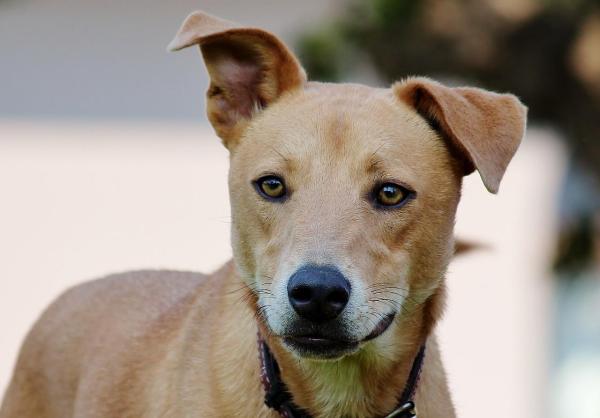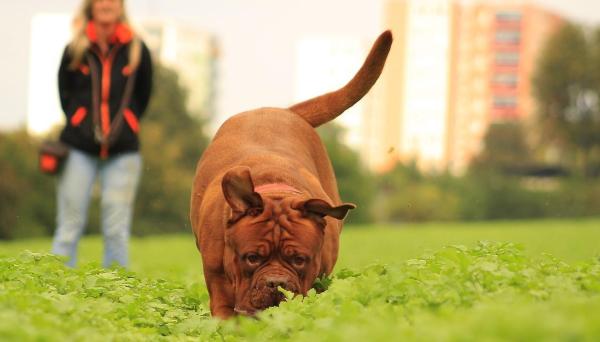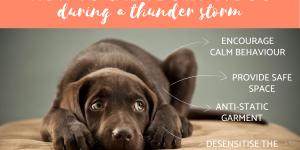Why is my Dog Scared of Other Dogs? Tips to Deal with a Dog's Fear



See files for Dogs
Is your dog scared of other dogs? When it sees other dogs, do its ears go down? Does its tail go between its legs? Does it cower and want to run away, or growl at the other dog to try and intimidate it?
Fear is a necessary and vital emotion: It allows animals to react in the face of danger, but if fear turns into a phobia or arises at inappropriate times it can become a big problem, and walks can become very stressful for your dog.
In this Animal Wised article we'll tell you why is your dog scared of other dogs with the best tips to deal with its fear.
Fear due to a lack of socialization
Your dog may be afraid of other dogs due to a lack of socialization. In other words, your dog didn't have enough contact with other dogs when it was a puppy.
This can occur in dogs that were separated from their siblings very early on and who don't know any other dogs in their adopted family. Adult dogs can be socialized, but it's more difficult than training a puppy.

Fear deriving from a traumatic experience
If your dog is fairly easily scared, an accumulation of bad experiences can encourage this fear and even turn it into phobia. This can happen when a small, easily-scared dog comes across large dogs with lots of energy who will want to play with it in a fairly rough manner.
When a young small dog is scared or goes through a traumatic experience as a puppy, it could later growl, bark or behave in other aggressive manners towards any large dogs that it comes across. Note that this may also occur in large dogs. Of course, this fear can also follow from actual attacks from other dogs.

Fear reinforced by the owners
Owners often want to help their dog when it is scared by stroking it and talking to it softly to calm it down. However, that actually worsens the problem. Indeed, doing so will only give the dog confirmation that it is right to be afraid.
Forcing him to be among the other dogs is also not a good idea, and it can even worsen the quality of your relationship with your dog.

How can I help my dog feel safe?
In order to help a dog that is scared of other dogs, the first thing is to accept it for what it is and not try and force it to overcome that fear in a single day. It will be important to build up the dog's confidence and security.
If your dog gets scared when approached by another dog, it is best if you exude calm and maintain neutral behavior. If try to calm it down by talking quietly to it, it might interpret this as justification for its fear. It could also encourage your dog to continue behaving like this in an attempt to get your attention.
Neither should you force it to be in a stressful situation, as this could traumatize it further and make it lose trust in you. Neither would it help it get over its fear in the slightest. Find out if your dog is stressed because of this situation.
At first, the simplest thing for your four-legged friend is to avoid coming across other dogs. You can help with three different techniques:
- Desensitization consists of progressively exposing it to the stressful situation until it no longer makes it stressed. In particular, you can keep your dog a few feet away from other dogs, gradually reducing this distance during walks in accordance with the dog's evolution and improvement. You can also arrange meetings with very gentle and quiet dogs, before progressively exposing them to more energetic or imposing dogs.
- Habituation consists of teaching the dog not to react to the stressful situation: Taking it for more walks in areas where you will come across other dogs will allow your dog to get used to them and thus realize that they are not a threat. If you apply this method, be careful not submit your dog into a situation which is too stressful for it, as this would make the situation worse.
- Counter-conditioning allows it to associate the stressful situation with a positive experience. For example, by playing with your dog when other dogs are near by it will associate this moment with game time, and will relax in the presence of other dogs.
You can apply these three methods together; however, the important thing is for you to respect your dog's learning speed. It is a process that can take time, and it depends on each dog in particular. If you feel that you can't tackle this situation alone, make sure you consult a dog behavioral expert or canine ethologist who will be able to advise you on the best steps to take for your dog in particular.
Dogs are social animals that need to interact with their peers, and helping them to overcome their fears in order to communicate with other dogs is a huge show of love that you can give to your dog.

If you want to read similar articles to Why is my Dog Scared of Other Dogs? Tips to Deal with a Dog's Fear, we recommend you visit our Behavioral problems category.










